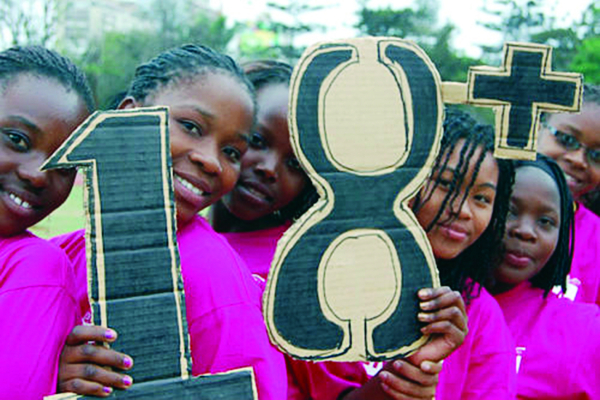
LOOKING resplendent in a chiffon white blouse and a demure black skirt, 22-year-old Loveness Mudzuru captivates the attention of her audience as she shares on her current life, which includes high teas with royalty in the Netherlands and First Ladies from Africa.
BY PHYLIS MBANJE
Her soft, almost baritone voice defies her age by its maturity. Her poised look is polished and she effortlessly engages with young girls and delegates who had attended the International Girl Child commemorations at United Nations Children’s Fund offices.
As Mudzuru, a mother of three, excitedly speaks on getting a degree in social work, a stranger would not have imagined that exactly a year ago, the young woman changed the circumstances for child brides and her testimony compelled the Constitutional Court to make a landmark ruling which banned child marriages.
Mudzuru was 19 and another child bride, Ruvimbo Tsopodzi (18), when they launched their challenge to the government’s Marriage Act in 2015, claiming that it discriminated against girls by setting the minimum age to marry at 16 for them but 18 for men.
They were assisted by a local organisation, ROOTS, which is headed by Beatrice Savadye.
Although the marriage laws are still to be aligned with the Constitution, the highly-publicised case drew a lot of attention, both locally and internationally, and brought stakeholders to the table and since then, spirited efforts are being made to make the ban a reality.
Mudzuru’s story on how she married at 16 after dropping out of school has been retold a thousand times, but it was the fight for other girls in her situation to be given a fair opportunity that has earned her well-deserved praise.
- Chamisa under fire over US$120K donation
- Mavhunga puts DeMbare into Chibuku quarterfinals
- Pension funds bet on Cabora Bassa oilfields
- Councils defy govt fire tender directive
Keep Reading
“A girl child can change the space by engaging and taking opportunities that are available at her disposal,” she says.
Speaking from the heart, she re-tells her story which gripped the nation and helped expose the social scourge which had been tolerated for far too long, but with serious repercussions on the girl child.
“Even if you (child brides) are isolated, rejected, you can still make it in life,” she says.
According to Plan International, three in 10 girls in Zimbabwe are married before they turn 18.
The government, through various ministries and other stakeholders, has been advocating for the ending child marriages, which not only cripple initiative of the girl child, but pose serious health challenges.
Over 14 million girls, (the bulk of which are child brides), between the ages of 15 and 19 in Africa give birth each year and are twice as likely to die during pregnancy or childbirth.
Early pregnancy is the second leading cause of death for girls in that same age group.
According to the International Centre for Research on Women (ICRW), girls who marry between the ages of 10 and 14 are five times as likely to die during pregnancy or childbirth as women are in their early 20s.
Another former child bride from Shamva, Mildred (not real name), also shares her heartbreaking story.
Born in a family which did not recognise the importance of educating a girl child, Mildred was stuck in hopelessness and opted to marry early.
“My father was gainfully employed, but chose not to send me to school. So I married early to escape all the problems, or so I thought,” she says, her voice filled with emotion and regret.
What she had assumed to be a safer option proved the opposite. A mere teenager with no education, she had to contend with her husband’s infidelity, a second wife and all the drama that comes with polygamous families.
“Once, I wanted to commit suicide. I bought the poison and was about to take it when I looked at my then three-year-old child and I failed to go through with it,” Mildred battles tears as she remembered the dark moment.
She wishes she had also been afforded the opportunity to go to school.
“To all of you girls, if you have the opportunity to go to school, do not waste it. No one recognises me. My husband’s other wife took away all my clothes as I was preparing to come here and I did not have anything decent to wear,” she said.
As Mildred bares her soul, a hush falls over the audience and a few shed tears openly, imagining the horror this young lady has gone through.
But she sees beyond her circumstances and has the courage to urge other young girls to tear through the patriarchal and traditional norms that stifle women’s initiative.
African Union Goodwill Ambassador for Ending Child Marriage, Nyaradzayi Gumbonzvanda, speaking at the same event, challenged all stakeholders to do more by giving young girls opportunities and more resources.
“We need to change the narrative, let us stop commodification of the girls and instead give them the platform to speak out. Let us create a critical mass, a social movement to transform their circumstances,” she said.
“Reject labels that limit women.”











